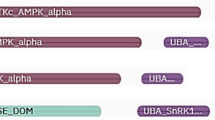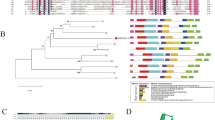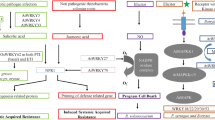Abstract
WRKY transcription factors participate in the salt stress responses of various plant species, but the underlying functional mechanisms are not well understood, particularly in grape. In this study, the role of VvWRKY13 in the salt stress response was characterized and the underlying physiological and molecular mechanisms were explored. The results show that VvWRKY13 expression was induced by salt stress, and the VvWRKY13 transcript level in the salt stress-sensitive cultivar was significantly higher than that in the resistant cultivars. Overexpression of VvWRKY13 in Arabidopsis significantly inhibited the growth of transgenic plants under salt stress, indicating that VvWRKY13 has a negative effect on the salt stress response. The photosynthetic rate, contents of proline and soluble sugars, activities of superoxide dismutase (SOD) and catalase (CAT), as well as transcriptional levels of proline and soluble sugar metabolic genes, such as P5CS1, SS1, SS2 and G6PDH, as well as SOD and CAT encoding genes CAT1, CAT2, and Cu/Zn-SOD, all decreased under salt stress, whereas hydrogen peroxide and oxygen-free radical contents increased in transgenic Arabidopsis plants compared with those of wild-type plants. VvWRKY13 suppressed upregulation of SnRK2.3, ABF1, ABF2, ABF3, RD29B, RD29A, and RAB18 induced by salt stress, but showed no significant effect on the transcript levels of SnRK2.2, SnRK2.6, or RD22, indicating that VvWRKY13 affects salt stress tolerance via a specific abscisic acid signaling pathway.
Key message
VvWRKY13, isolated from grapevine, negatively regulate salt stress tolerance by depressing photosynthetic capacity, inhibiting salt-induced accumulation of osmolytes and up-regulation in antioxidant activity as well as expression of related genes. VvWRKY13 may affects salt stress tolerance by specific ABA signalling.






Similar content being viewed by others
References
Agarwal P, Dabi M, Agarwal PK (2014) Molecular cloning and characterization of a group II WRKY transcription Factor from Jatropha curcas, an important biofuel crop. DNA Cell Biol 33(8):503–513
Agarwal P, Dabi M, Sapara KK, Joshi PS, Agarwal PK (2016) Ectopic expression of JcWRKY transcription factor confers salinity tolerance via salicylic acid signaling. Front Plant Sci 7:e1541
Almeida P, Feron R, de Boer GJ, de Boer AH (2014) Role of Na+, K+, Cl−, proline and sucrose concentrations in determining salinity tolerance and their correlation with the expression of multiple genes in tomato. AoB Plants 6:plu039
Banjara M, Zhu LF, Shen GX, Payton P, Zhang H (2012) Expression of an Arabidopsis sodium/proton antiporter gene (AtNHX1) in peanut to improve salt tolerance. Plant Biotechnol Rep 6(1):59–67
Bose J, Xie Y, Shen W, Shabala S (2013) Haem oxygenase modifies salinity tolerance in Arabidopsis by controlling K+ retention via regulation of the plasma membrane H+-ATPase and by altering SOS1 transcript levels in roots. J Exp Bot 64(2):471–481
Cai R, Dai W, Zhang C, Wang Y, Wu M, Zhao Y, Ma Q, Xiang Y, Cheng B (2017) The maize WRKY transcription factor ZmWRKY17 negatively regulates salt stress tolerance in transgenic Arabidopsis plants. Planta 246(6):1215–1231
Chi YJ, Yang Y, Zhou Y, Zhou J, Fan BF, Yu JQ, Chen Z (2013) Protein-protein interactions in the regulation of WRKY transcription factors. Mol Plant 6:287–300
Dai W, Wang M, Gong X, Liu JH (2018) The transcription factor FcWRKY40 of Fortunella crassifolia functions positively in salt tolerance through modulation of ion homeostasis and proline biosynthesis by directly regulating SOS2 and P5CS1 homologs. New Phytol 219(3):972–989
Deinlein U, Stephan AB, Horie T, Luo W, Xu G, Schroeder JI (2014) Plant salt-tolerance mechanisms. Trends Plant Sci 19(6):371–379
Ding ZJ, Yan JY, Xu XY, Yu DQ, Li GX, Zhang SQ, Zheng SJ (2014) Transcription factor WRKY46 regulates osmotic stress responses and stomatal movement independently in Arabidopsis. Plant J 79(1):13–27
Eulgem T, Rushton PJ, Robatzek S, Somssich IE (2000) The WRKY superfamily of plant transcription factors. Trends Plant Sci 5(5):199–206
Fu L, Ding Z, Han B, Hu W, Li Y, Zhang J (2016) Physiological investigation and transcriptome analysis of polyethylene glycol (PEG)-induced dehydration stress in Cassava. Int J Mol Sci 17:e283
Fujita Y, Yoshida T, Yamaguchi-Shinozaki K (2013) Pivotal role of the AREB/ABF-SnRK2 pathway in ABRE-mediated transcription in response to osmotic stress in plants. Physiol Plant 147(1):15–27
Guo R, Qiao H, Zhao J, Wang X, Tu M, Guo C, Wan R, Li Z, Wang X (2018) The grape VlWRKY3 gene promotes abiotic and biotic stress tolerance in transgenic Arabidopsis thaliana. Front Plant Sci 9:e545
He F, Sheng M, Tang M (2017) Effects of rhizophagus irregularis on photosynthesis and antioxidative enzymatic system in Robinia pseudoacacia L. under drought stress. Front Plant Sci 8:e183
Jia H, Wang C, Wang F, Liu S, Li G, Guo X (2015) GhWRKY68 reduces resistance to salt and drought in transgenic Nicotiana benthamiana. PLoS ONE 10(3):e0120646
Kulkarni M, Soolanayakanahally R, Ogawa S, Uga Y, Selvaraj MG, Kagale S (2017) Drought response in wheat: key genes and regulatory mechanisms controlling root system architecture and transpiration efficiency. Front Chem 5:e106
Li H, Xu Y, Xiao Y, Zhu Z, Xie X, Zhao H, Wang Y (2010) Expression and functional analysis of two genes encoding transcription factors, VpWRKY1 and VpWRKY2, isolated from Chinese wild Vitis pseudoreticulata. Planta 232(6):1325–1337
Li JB, Luan YS, Liu Z (2015) Overexpression of SpWRKY1 promotes resistance to Phytophthora nicotianae and tolerance to salt and drought stress in transgenic tobacco. Physiol Plant 155(3):248–266
Liang QY, Wu YH, Wang K, Bai ZY, Liu QL, Pan YZ, Zhang L, Jiang BB (2017) Chrysanthemum WRKY gene DgWRKY5 enhances tolerance to salt stress in transgenic chrysanthemum. Sci Rep 7:e4799
Liu QL, Zhong M, Li S, Pan YZ, Jiang BB, Jia Y, Zhang HQ (2013) Overexpression of a chrysanthemum transcription factor gene, DgWRKY3, in tobacco enhances tolerance to salt stress. Plant Physiol Biochem 69:27–33
Ma Q, Zhang GK, Hou LX, Wang WJ, Hao J, Liu X (2015) Vitis vinifera VvWRKY13 is an ethylene biosynthesis-related transcription factor. Plant Cell Rep 34(9):1593–1603
Ma J, Gao X, Liu Q, Shao Y, Zhang D, Jiang L, Li C (2017) Overexpression of TaWRKY146 increases drought tolerance through inducing stomatal closure in Arabidopsis thaliana. Front Plant Sci 8:e2036
Ma Q, Xia Z, Cai Z, Li L, Cheng Y, Liu J, Nian H (2019) GmWRKY16 Enhances drought and salt tolerance through an ABA-mediated pathway in Arabidopsis thaliana. Front Plant Sci 9:1979
Msanne J, Lin J, Stone JM, Awada T (2011) Characterization of abiotic stress-responsive Arabidopsis thaliana RD29A and RD29B genes and evaluation of transgenes. Planta 234(1):97–107
Mzid R, Zorrig W, Ben Ayed R, Ben Hamed K, Ayadi M, Damak Y, Lauvergeat V, Hanana M (2018) The grapevine VvWRKY2 gene enhances salt and osmotic stress tolerance in transgenic Nicotiana tabacum. 3 Biotech 8(6):e277
Roychoudhury A, Paul S, Basu S (2013) Cross-talk between abscisic acid-dependent and abscisic acid-independent pathways during abiotic stress. Plant Cell Rep 32(7):985–1006
Song H, Wang P, Hou L, Zhao S, Zhao C, Xia H, Li P, Zhang Y, Bian X, Wang X (2016) Global analysis of WRKY genes and their response to dehydration and salt stress in soybean. Front Plant Sci 7:e9
Ullah A, Sun H, Hakim Yang X, Zhang X (2018) A novel cotton WRKY gene, GhWRKY6-like, improves salt tolerance by activating the ABA signaling pathway and scavenging of reactive oxygen species. Physiol Plant 162(4):439–454
Wang M, Vannozzi A, Wang G, Liang YH, Tornielli GB, Zenoni S, Cavallini E, Pezzotti M, Cheng ZM (2014) Genome and transcriptome analysis of the grapevine (Vitis vinifera L) WRKY gene family. Hortic Res 1:16
Wang F, Chen HW, Li QT, Wei W, Li W, Zhang WK, Ma B, Bi YD, Lai YC, Liu XL, Man WQ, Zhang JS, Chen SY (2015a) GmWRKY27 interacts with GmMYB174 to reduce expression of GmNAC29 for stress tolerance in soybean plants. Plant J 83(2):224–236
Wang XT, Zeng J, Li Y, Rong XL, Sun JT, Sun T, Li M, Wang LZ, Feng Y, Chai RH, Chen MJ, Chang JL, Li KX, Yang GX, He GY (2015b) Expression of TaWRKY44, a wheat WRKY gene, in transgenic tobacco confers multiple abiotic stress tolerances. Front Plant Sci 6:615
Wang K, Zhong M, Wu YH, Bai ZY, Liang QY, Liu QL, Pan YZ, Zhang L, Jiang BB, Jia Y, Liu GL (2017) Overexpression of chrysanthemum transcription factor gene DgNAC1 improves the salinity tolerance in chrysanthemum. Plant Cell Rep 36(4):571–581
Wei W, Cui MY, Hu Y, Gao K, Xie YG, Jiang Y, Feng JY (2018) Ectopic expression of FvWRKY42, a WRKY transcription factor from the diploid woodland strawberry (Fragaria vesca), enhances resistance to powdery mildew, improves osmotic stress resistance, and increases abscisic acid sensitivity in Arabidopsis. Plant Sci 275:60–74
Xu XP, Chen CH, Fan BF, Chen ZX (2006) Physical and functional interactions between pathogen-induced Arabidopsis WRKY18, WRKY40, and WRKY60 transcription factors. Plant Cell 18:1310–1326
Yan H, Jia H, Chen X, Hao L, An H, Guo X (2014) The cotton WRKY transcription factor GhWRKY17 functions in drought and saltstress in transgenic Nicotiana benthamiana through ABA signaling and the modulation of reactive oxygen species production. Plant Cell Physiol 55(12):2060–2076
Yang G, Zhang W, Liu Z, Yi-Maer AY, Zhai M, Xu Z (2017) Both JrWRKY2 and JrWRKY7 of Juglans regia mediate responses to abiotic stresses and abscisic acid through formation of homodimers and interaction. Plant Biol (Stuttg) 19(2):268–278
Zhu Z, Shi J, Cao J, He M, Wang Y (2012) VpWRKY3, biotic and abiotic stress-related transcription factor from the Chinese wild Vitis pseudoreticulata. Plant Cell Rep 31(11):2109–2120
Acknowledgements
This study was supported by the National Key Research and Development Program of China (Grant No. 2018YFD1000302), the National Natural Science Foundation of China (Grant No. 31572107, 31872082, 31770275 and 31401844) and a Project of Shandong Province Higher Educational Science and Technology Program (Grant No. J18KA133).
Author information
Authors and Affiliations
Contributions
XL and YC conceived and designed the experiments, DZ and LH conducted the experiments, and ZZ and JH performed the experiments. YC wrote the manuscript. ZZ and JH analyzed the data and prepared the figures. All authors have read and approved the final manuscript.
Corresponding author
Ethics declarations
Conflict of interest
The authors declare no conflicts of interest.
Additional information
Communicated by Manoj Prasad.
Publisher's Note
Springer Nature remains neutral with regard to jurisdictional claims in published maps and institutional affiliations.
Electronic supplementary material
Below is the link to the electronic supplementary material.
11240_2019_1620_MOESM1_ESM.tif
Supplementary material 1 Supplemental Fig. 1 Genetic map of plasmid Super1300 used for Arabidopsis transformation (TIFF 327 kb)
Rights and permissions
About this article
Cite this article
Yongmei, C., Zhen, Z., Dan, Z. et al. VvWRKY13 from Vitis vinifera negatively modulates salinity tolerance. Plant Cell Tiss Organ Cult 139, 455–465 (2019). https://doi.org/10.1007/s11240-019-01620-8
Received:
Accepted:
Published:
Issue Date:
DOI: https://doi.org/10.1007/s11240-019-01620-8




